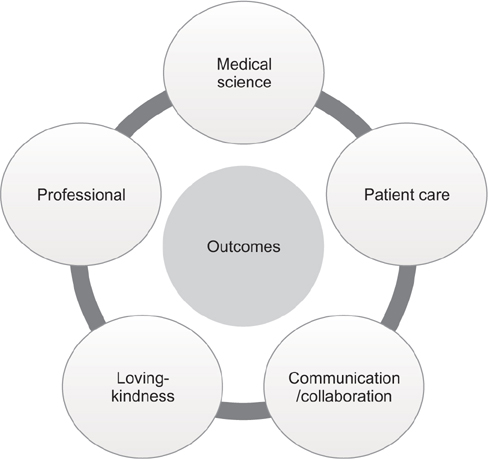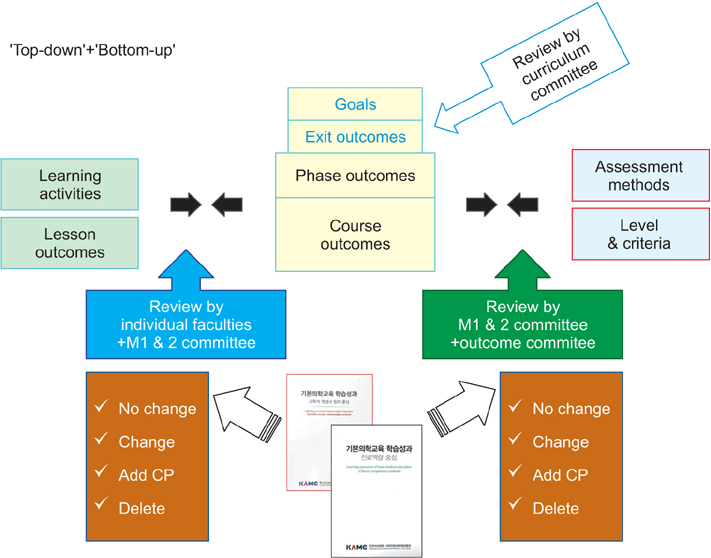Ewha Med J.
2017 Jan;40(1):35-40. 10.12771/emj.2017.40.1.35.
Implementation of Outcome-Based Medical Education Theory into the Pre-existing Curriculum
- Affiliations
-
- 1Department of Internal Medicine, Ewha Womans University School of Medicine, Seoul, Korea.
- 2Department of Medical Education, Ewha Womans University School of Medicine, Seoul, Korea. jjhan@ewha.ac.kr
- 3Department of Microbiology, Ewha Womans University School of Medicine, Seoul, Korea.
- 4Department of Otorhinolaryngology, Ewha Womans University School of Medicine, Seoul, Korea.
- KMID: 2367895
- DOI: http://doi.org/10.12771/emj.2017.40.1.35
Abstract
OBJECTIVES
This paper aims to describe an outcome-based curriculum development process at a medical school that has difficulty in advancement from the higher stage outcomes to the individual lesson outcomes, and to propose a way to implement it practically.
METHODS
We reviewed the objectives, strategies and previous products of the school's taskforce activities and suggested the principle of bidirectional approaches of outcome based curriculum development.
RESULTS
The developing strategy identified such as firstly, the evaluation of present curriculum and then, the review of the outcomes developed previously with considering the nation-wide environmental change in medical education. Then, we selected one example course which was focused the resources of the school to, and finally the product of the example course was propagated to the other courses with central monitoring.
CONCLUSION
Bidirectional model of "˜Top-down' plus "˜Bottom-up' approaches could be an efficient way to develop the outcome-based curriculum in a medical school, which has difficulties to advance the developing process due to various reasons including limited resources.
Keyword
Figure
Reference
-
1. Harden RM. Developments in outcome-based education. Med Teach. 2002; 24:117–120.2. Harden RM, Crosby JR, Davis MH. AMEE guide No. 14: Outcome-based education: Part 1-An introduction to outcomebased education. Med Teach. 1999; 21:7–14.3. Han JJ. Global doctor's role and outcome-based medical education. Ewha Med J. 2013; 36:3–8.4. Lee JK. Reflection on a Methodoloy of Developing Competency-Based Curriculum: based on a Case of Curriculum Development for Improving Marketing Competency. J Educ Technol. 2002; 18:25–56.5. Harden RM. Outcome-based education: the future is today. Med Teach. 2007; 29:625–629.6. Newble D, Stark P, Bax N, Lawson M. Developing an outcome-focused core curriculum. Med Educ. 2005; 39:680–687.7. Smith SR, Dollase R. AMEE guide no. 14: outcome-based education: part 2-planning, implementing and evaluating a competency-based curriculum. Med Teach. 1999; 21:15–22.8. Ahn JH, Yang EB. An outcome-based approach in medical curriculum development. Korean Med Educ Rev. 2013; 15:9–18.9. McNeil HP, Hughes CS, Toohey SM, Dowton SB. An innovative outcomes-based medical education program built on adult learning principles. Med Teach. 2006; 28:527–534.10. Gruppen LD. Outcome-based medical education: implications, opportunities, and challenges. Korean J Med Educ. 2012; 24:281–285.11. WFME. WFME standards for basic education. c2016. Available from http://wfme.org/standards/bme.
- Full Text Links
- Actions
-
Cited
- CITED
-
- Close
- Share
- Similar articles
-
- Implementation of Problem-based Learning to Established Medical Schools with Insufficient Resources
- Implementation of the Evidence-Based Medicine to Korean Medical Schools
- Cognitive Constructivism in the Development of Medical Education
- Cognitive Constructivism in the Development of Medical Education
- The Process of Developing a Clinical Presentation Curriculum





